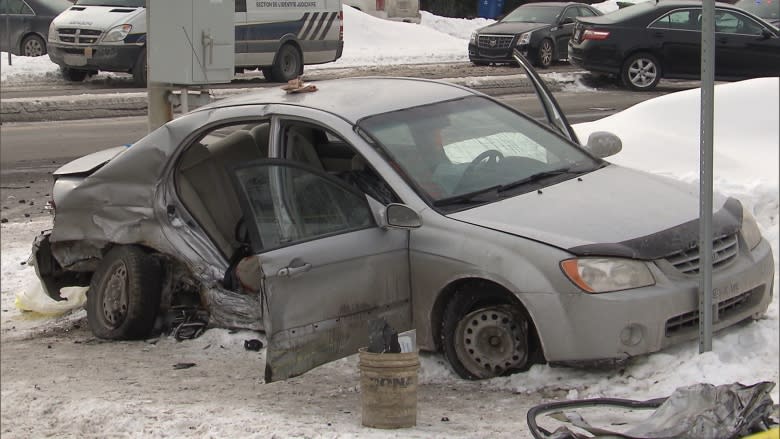Longueuil fatal crash: Prosecutor says decision not to lay charges based on evidence
Quebec's Director of Criminal and Penal Prosecutions (DCPC) is denying that pressure from any outside groups influenced its decision not to press charges against an officer involved in a fatal car crash in Longueuil, Que., that killed a five-year-old boy.
"Nobody is above the law. The public should know that the prosecutors took into consideration all the facts — all the evidence," said spokesman René Verret.
The incident happened last February, at the intersection of Gaétan-Boucher and Davis boulevards in Longueuil, on Montreal's South Shore.
Four unmarked provincial police cars were involved in surveillance of Robert Parent, the former director of the Quebec Liberal Party.
The operation was carried out by Quebec’s anti-corruption police unit.
Around 8 a.m. on Feb. 13, the police officers reportedly accelerated to catch up with the car that was tailing Parent’s Mercedes.
A police officer driving a black Camry sped through the intersection, crashing into the grey Kia sedan carrying Mike Belance, his five-year-old son and his 10-year-old stepdaughter.
The young boy suffered head trauma and died Feb. 17 in hospital. The girl suffered minor injuries.
A police document established that the tail was part of an investigation related to corruption, breach of trust and illegal political party financing.
Crown: All evidence taken into account
Verret said during a news conference late Friday afternoon that prosecutors had no knowledge about the nature of the officers' work, or that police were tailing the former director of the Quebec Liberal Party.
"The Crown prosecutors knew the officers had important work to do, and for them it was necessary to go at a certain speed," Verret said, adding that the officer was travelling at 109 km/h at the moment of impact.
At 8 a.m., in the moments before the crash, the officer was travelling at 122 km/h in a 50 km/h zone.
Verret said the speeding was not sufficient reason to press charges.
"We cannot isolate the simple fact that the police officer was driving fast.… The police officers made a decision that … it was necessary to go at that speed in order to reach their target. It was not an officer who was on a day off — it was an officer who was working who determined he had to go at that speed."
Verret said all the evidence in the case was taken into consideration before a decision was reached.
The victim's father gave a statement to police after the collision, Verret said, in which he told police he shouldn't have turned left and didn't have the right of way.
"The father used to drive at this place every day, and he knew there was a priority light that permits him to cross at this place safely. He decided not to wait ... and cross at this time anyway. This was not without risk," Verret said.
Crown meets with family
Prosecutors met with the victim's family to explain why charges won't be laid in the case.
No one from the family was at the news conference at the Montreal courthouse.
"They did not want to attend. They prefer to live these very difficult moments in silence, but yes, we had a meeting that was very satisfactory with the family," Verret said, adding that the DCPC is working on a policy to be more transparent and make information more readily available to the public.
"The public has the right to have an explanation. The DCPC is a public institution and the public has a right to information."
Quebec's opposition parties are calling for an independent review.



